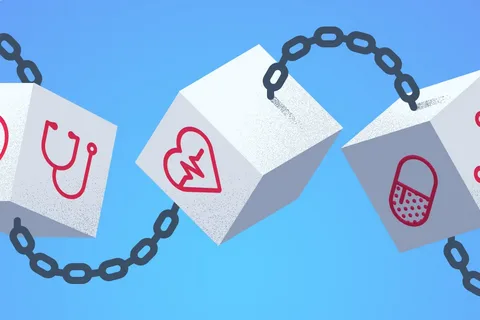Blockchain technology has transformed various industries, and one of its most promising applications is in healthcare data interoperability. In this article, we will explore the challenges faced in healthcare data interoperability, the role of blockchain as a solution, real-world examples, the implementation process, benefits, and the future prospects of this revolutionary combination.
I. Introduction
A. Brief Overview of Blockchain
Blockchain, at its core, is a decentralized and distributed ledger technology that ensures secure, transparent, and tamper-resistant record-keeping. It gained prominence initially in the financial sector but has since expanded its reach into various domains, including healthcare.
B. Significance of Healthcare Data Interoperability
Healthcare data interoperability refers to the ability of different information systems, devices, and applications to access, exchange, integrate, and cooperatively use health data. The lack of seamless interoperability has been a persistent challenge in the healthcare industry, leading to fragmented patient records and inefficient processes.
II. The Challenges in Healthcare Data Interoperability
A. Fragmented Data Systems
Healthcare organizations often operate with disparate systems that do not communicate effectively. This fragmentation results in incomplete patient profiles, leading to suboptimal decision-making and compromised patient care.
B. Security Concerns
The sensitive nature of healthcare data makes it a prime target for cyber threats. Traditional centralized systems are susceptible to breaches, jeopardizing patient confidentiality.
C. Lack of Standardization
The absence of standardized protocols for data exchange hinders seamless communication between different healthcare entities. This lack of uniformity creates interoperability roadblocks.
III. Blockchain as a Solution
A. Decentralized Nature
Blockchain’s decentralized architecture addresses the issue of fragmented data systems. It enables the creation of a unified, secure, and transparent ledger accessible to authorized participants across the healthcare network.
B. Immutable Record-Keeping
The immutability of blockchain ensures that once data is recorded, it cannot be altered. This feature enhances the reliability of healthcare records, reducing the risk of errors and fraud.
C. Enhanced Security
Blockchain employs cryptographic techniques to secure data, providing a robust defense against unauthorized access and data breaches. Patient information stored on the blockchain is encrypted and can only be accessed by authorized personnel.
IV. Real-world Examples
A. Use Cases of Blockchain in Healthcare
Blockchain has found applications in various healthcare scenarios, such as secure patient data sharing, drug traceability, and clinical trial management. These use cases demonstrate the versatility and adaptability of blockchain technology.
B. Success Stories
Several healthcare organizations have successfully implemented blockchain solutions, witnessing improvements in data interoperability, security, and overall efficiency. Case studies showcase the transformative impact of blockchain on the healthcare landscape.
V. Implementing Blockchain in Healthcare
A. Overcoming Resistance
Adopting new technologies often faces resistance. Healthcare professionals may be skeptical or unfamiliar with blockchain. Effective communication and education are essential to address concerns and facilitate a smooth transition.
B. Integrating Blockchain with Existing Systems
Integrating blockchain with legacy systems requires careful planning and execution. Compatibility issues need to be addressed to ensure seamless interoperability between the new blockchain infrastructure and existing healthcare IT systems.
C. Training Healthcare Professionals
A crucial aspect of successful implementation is providing comprehensive training to healthcare professionals. Familiarity with blockchain technology enhances their ability to leverage its benefits in daily operations.
VI. Benefits of Blockchain in Healthcare Data Interoperability
A. Streamlined Processes
Blockchain streamlines healthcare processes by providing a unified and standardized platform for data exchange. This streamlining leads to increased efficiency in care delivery.
B. Improved Patient Care
Access to comprehensive and accurate patient records enables healthcare providers to make informed decisions, ultimately leading to improved patient care outcomes.
C. Data Accuracy
Blockchain’s immutable nature ensures data accuracy, reducing errors and discrepancies in patient records. This accuracy is critical for precise diagnoses and effective treatment plans.
VII. Future Prospects
A. Technological Advancements
Ongoing technological advancements in blockchain will further enhance its capabilities, addressing current limitations and opening new possibilities for healthcare data interoperability.
B. Global Adoption
As awareness grows and successful implementations become more prevalent, global adoption of blockchain in healthcare is expected to increase. This widespread adoption will contribute to a more interconnected and efficient healthcare ecosystem.
VIII. Challenges and Criticisms
A. Scalability Concerns
The scalability of blockchain remains a concern as the volume of healthcare data continues to grow. Addressing scalability issues is crucial for ensuring the widespread applicability of blockchain solutions.
B. Regulatory Issues
The regulatory landscape for blockchain in healthcare is still evolving. Clear and standardized regulations are essential to ensure compliance and build trust in the use of blockchain for sensitive healthcare data.
IX. Conclusion
In conclusion, the integration of blockchain in healthcare data interoperability holds immense promise for revolutionizing the industry. By addressing the challenges of fragmented data, enhancing security, and providing a standardized platform, blockchain contributes to a more efficient and patient-centric healthcare ecosystem.
FAQs
- Is blockchain only applicable to large healthcare organizations?
- No, blockchain can be implemented by healthcare organizations of all sizes to enhance data interoperability and security.
- How does blockchain ensure the privacy of patient data?
- Blockchain uses cryptographic techniques to encrypt patient data, ensuring that it is accessible only to authorized individuals.
- What are the potential drawbacks of implementing blockchain in healthcare?
- Scalability concerns and evolving regulatory landscapes are some of the potential challenges associated with implementing blockchain in healthcare.
- Can blockchain be integrated with existing healthcare IT systems?
- Yes, with careful planning and execution, blockchain can be integrated with existing healthcare IT systems.
- How can healthcare professionals stay updated on blockchain developments?
- Continuous education and training programs can help healthcare professionals stay informed about the latest blockchain developments in the healthcare sector.
